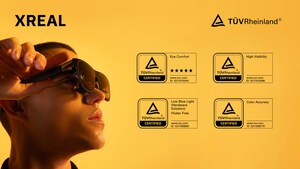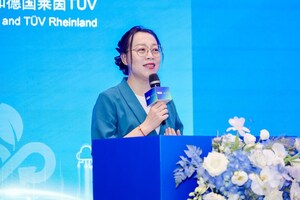TUV Rheinland Shines at SNEC 2018, the biggest PV Power Expo in China
SHANGHAI, June 20, 2018 /PRNewswire/ -- From 28-30 May 2018, the most influential annual event in the global photovoltaic (PV) industry, the SNEC 12th (2018) International Photovoltaic Power Generation and Smart Energy Exhibition and Conference, was staged on a grand scale in Shanghai. In Booth E1-006, TÜV Rheinland demonstrated its innovative PV solutions comprehensively, systematically and from a range of perspectives, showing how these solutions are helping to upgrade the industry and promote energy restructuring.
TÜV Rheinland Joins Global PV Industry Leaders in Discussing the Industry's Development from an Objective Third-Party Perspective
During the event, Li Weichun, General Manager of Solar, TÜV Rheinland Greater China, was invited to contribute to an exciting dialogue held by leaders in the global photovoltaic industry from the EU, Asia and North America, such as the CEOs of bedrock PV companies, experts and scholars in the field, market analysts, representatives of financial institutions and media representatives. Li spoke on behalf of TÜV Rheinland, as an authoritative international third party assessment and certification institution, about trends in the development of the PV industry.
Li discussed ways of furthering the development and enhancing the competitiveness of the PV industry both internally and by soliciting external assistance. He noted that whilst we must pay close attention to cutting costs and improving efficiency, "we should not forget quality enhancement, which relies on the mutual agreement and effort of the whole industry." He explained that the process of cutting costs does not apply solely to equipment and systems. "We should comprehensively consider the whole life cycle cost of a PV power system and rely on the professional strength of third party institutions to help control risk, reduce costs and improve earnings," Li said. In addition, Li noted, the PV industry should be "integrated with new technologies from other fields, such as energy storage, Internet and electric vehicle technologies, to achieve energy complementarity, energy intelligentisation and energy digitalisation and create more new ecosystems for PV applications."
The expo held many highlights for TÜV Rheinland. The company staged various certificate issuing ceremonies, entered into strategic cooperation agreements with numerous enterprises and showcased its outstanding service ability in the PV field.
- PV components
TÜV Rheinland issued the world's first cTUVus junction box certificate to Zhejiang Renhe Solar, providing strong support for Renhe Solar's entry into the US market. This also testifies to the importance of TÜV Rheinland as a global PV certification institution.
TÜV Rheinland awarded Suzhou Jolywood the world's first 2PfG 1793 11/17 certificate and IEC 62788 certificate, which cover all aspects of the safety and performance of Jolywood products. This also indicates that Chinese PV backsheets now lead the world in terms of technological strength and quality.
XTong Technology and TÜV Rheinland held a ceremony to sign an agreement on cooperating on the RSD Safety Bridge. This will help to ensure that products meet the newest safety requirements of the North American market. The two sides will join hands to respond to market development with high-quality technological innovation, meet the diverse demands of the market and make power station management faster, safer, more intelligent and more practical.
To meet the requirements of the latest double-sided solar cell, Suzhou Cybrid rolled out a highly waterproof transparent backsheet, which occupies a unique place among other such new products. Anhui Dh-Solar not only manufactures subassemblies, but also researches and develops brand-new intelligent junction boxes to ensure the intelligence of its products. TÜV Rheinland has issued certificates for the latest Cybrid and Dh-Solar products, verifying the quality of these new products and the service the companies provide to clients.
- PV Modules
Longi Solar and Suzhou Talesun Solar Technologies won laboratory accreditation from TÜV Rheinland. In accordance with IEC/ISO 17025, "General Requirement for Testing and Calibration of Laboratory Ability", and the technological requirements of related testing standards, TÜV Rheinland conducted numerous tests of the two companies' management systems, environments, staff technological ability and laboratory equipment, and ultimately approved of their capacity. This accreditation strongly testifies to the high management level and excellent testing capacity of the two companies' laboratories.
At the event, TÜV Rheinland also signed strategic cooperation agreements with Suzhou Talesun Solar Technologies. The two parties will together provide testing and certification across the PV industrial chain and pursue research on and discussion of technological innovation in the PV standard field.
During the SNEC, TÜV Rheinland issued many enterprises with new versions of the certificates IEC 61215 and IEC 61730.
Yingli Solar received certification in accordance with IEC 61215, 61730-1/-2 (safety testing extra-strict version) and 2PfG 2645/11.17, TÜV Rheinland's internal standard for bifacial modules. These standards solved issues that had long troubled the industry, such as how to measure the power, demarcate the limitations and comprehensively assess the safety and performance of bifacial modules. As the first company to be awarded this certificate, Yingli fully demonstrated both the advantages of bifacial technologies and the reliability of its products.
Sun-tech Power's series of PV half-chip components won new versions of the IEC 61215 and IEC 61730 certificates.
Zn Shine Solar was awarded the first multiple main gate double glass component certificate based on the new versions of IEC 61215 and IEC 61730.
Gain Solar earned the first BIPV component certificate based on the new versions of IEC 61215 and IEC 61730 issued by TÜV Rheinland.
- PV Electronics
Goodwe's GW5000S-BP series of energy storage inverters was awarded a certificate by TÜV Rheinland. This proved that Goodwe's ability to innovate in the household sector and pursuit of safer and more efficient products will lead the household PV market into a new era.
ABB's latest PV string inverter was awarded a certificate by TÜV Rheinland. This was the first product developed by ABB China to target the Chinese and global markets, based on ABB's strong technological platform.
Guangzhou SAJ's R5 series of household inverters was awarded TÜV Rheinland's certificate. These products are mainly used in household PV grid-connected systems. They demonstrate SAJ's determination to enter the household market, the strength of its technology and the quality of its products.
Delta's M series of PV inverters was awarded a certificate by TÜV Rheinland. These products meet the requirements of IEC/EN 62109-1/-2. Comprehensive testing and assessment of the products' structure, thermal stability, electromagnetic compatibility and grid connection characteristics confirmed the safety and reliability of this series.
TÜV Rheinland and Shanghai Trannergy signed a strategic cooperation agreement focusing on the design and production of solar power grid-connection inverters and PV monitoring systems; PV system planning; and the consolidation and deepening of mutual trust. TÜV Rheinland will help Shanghai Trannergy to continuously enhance its research and development activities in new product lines and improve the reliability and performance of its products.
- PV Power Plants
With years of experience of providing testing services for PV power plants, TÜV Rheinland recently provided authoritative technological support for cross-over cooperation on PV power plant technology, capital and finance through a technology risk control service, and offered an innovative new paradigm for cross-over cooperation on financial capital and professional technology platforms.
At the event, TÜV Rheinland and Zhongjin Guotai signed a strategic cooperation agreement to achieve strong mutual advantages, attracting widespread attention. The two sides decided to cooperate comprehensively to provide technology risk control and financing services for key equipment factories, EPC companies, PV power plant investors, property owners and financial institutions. The technical risk control service provided by TÜV Rheinland not only enables Zhongjin Guotai to comprehensively manage and control the quality risk associated with projects but also helps it to reduce financial risk and ensure its funding security. The two parties' cooperation is expected to provide a higher-quality technology risk control service and a one-stop customized financial service for all areas of the PV industry chain.
In addition, TÜV Rheinland signed a strategic cooperation agreement with Uniex New Energy on testing and certification, household system standard development and quality assessment for the whole PV industry chain, including PV cells, modules and power plants. The two parties will also cooperate comprehensively on power plant quality testing and assessment.
Initiates strategic cooperation on PV block chains to catalyse a new energy business model
Another highlight was the PV blockchain strategic programme co-launched by TÜV Rheinland and other industry peers, which reflected TÜV Rheinland's continuous innovation in the PV field, leading the development of the industry by applying cutting-edge block chain technology. The project, entitled "Benefit Trading of PV Power Plant Based on Block Chain Technology", will be jointly designed and operated by nine professional organisations, namely Pixiu, Gezhouba Electric Power, TÜV Rheinland, Willis, ABB, CMB, Zhongcai Merchants Investment Group, Dasol and Rison.
Blockchain technology is characterized by decentralization, transparency and trustworthiness, high security, traceability, non-tampering, intelligent management, etc., allowing it to effectively link energy flow, capital flow and information flow. It can thus be widely applied in the energy field. Introducing blockchain technology to PV power station projects may challenge and reshape power stations' existing models of centralized energy production and distribution, business and profit.
The concept underlying the blockchain project is that of an "alliance chain"; the nine parties will maintain a long-term strategic alliance, cooperating on providing professional services and technical support in their respective product/service areas. They will work together to set up technical standards for the entire PV power plant industry, improve financing schemes and control operational risk, thus jointly promoting the development and upgrade of the industry.
At the project signing ceremony, Chris Zou, Vice President of Solar, TÜV Rheinland Greater China, described the use of blockchain technology to build PV power plants. He hoped that this "novel concept" would "break down the business structures and profit models of traditional energy enterprises and catalyse the development of new business models." He went on to explain that we are currently at a historical watershed in the transformation of energy structure. "In the future, the energy industry will experience great changes in energy generation, transmission, use and storage, as well as in energy-related financial transactions," he said, stressing TÜV Rheinland's commitment to "working with industry colleagues to actively introduce new technologies and concepts to promote the long-term development of the PV industry."
SOURCE TUV Rheinland Greater China
WANT YOUR COMPANY'S NEWS FEATURED ON PRNEWSWIRE.COM?
Newsrooms &
Influencers
Digital Media
Outlets
Journalists
Opted In






Share this article